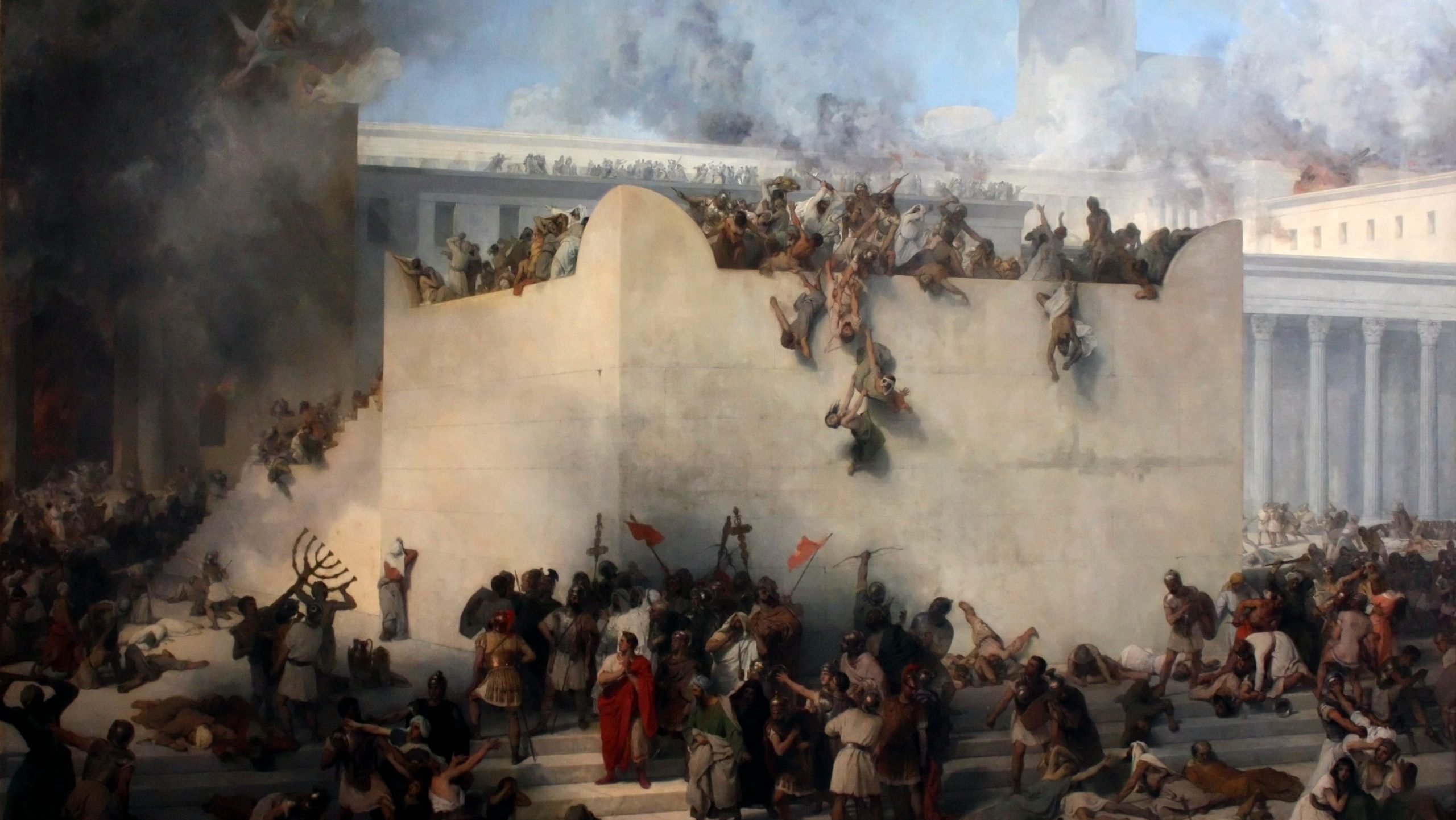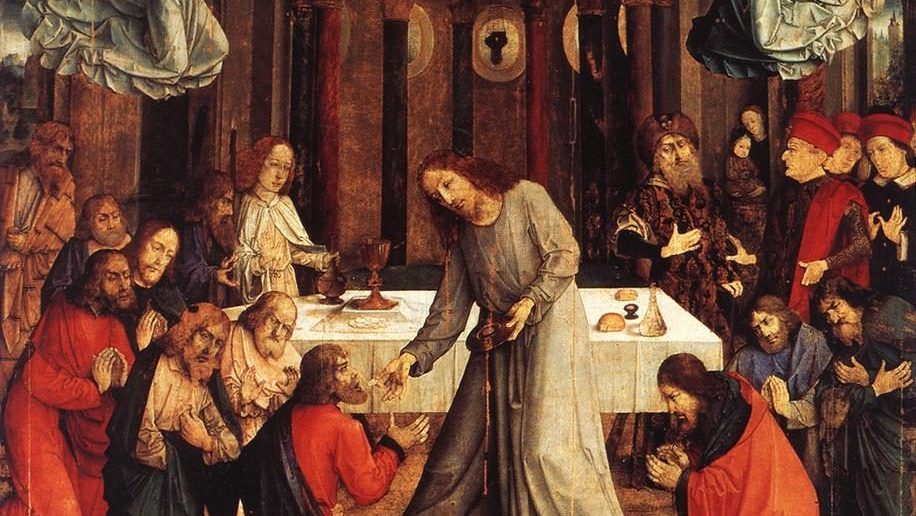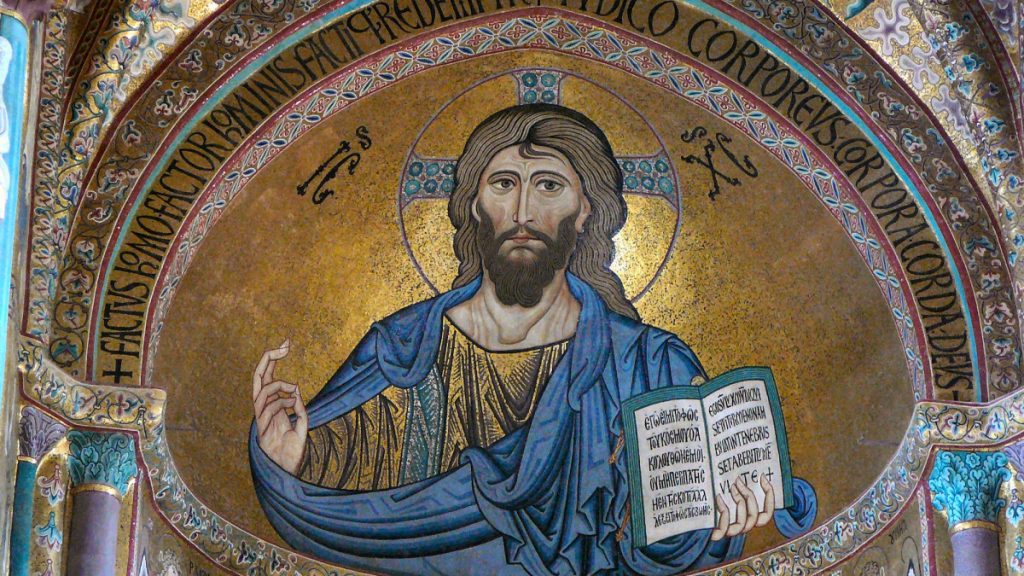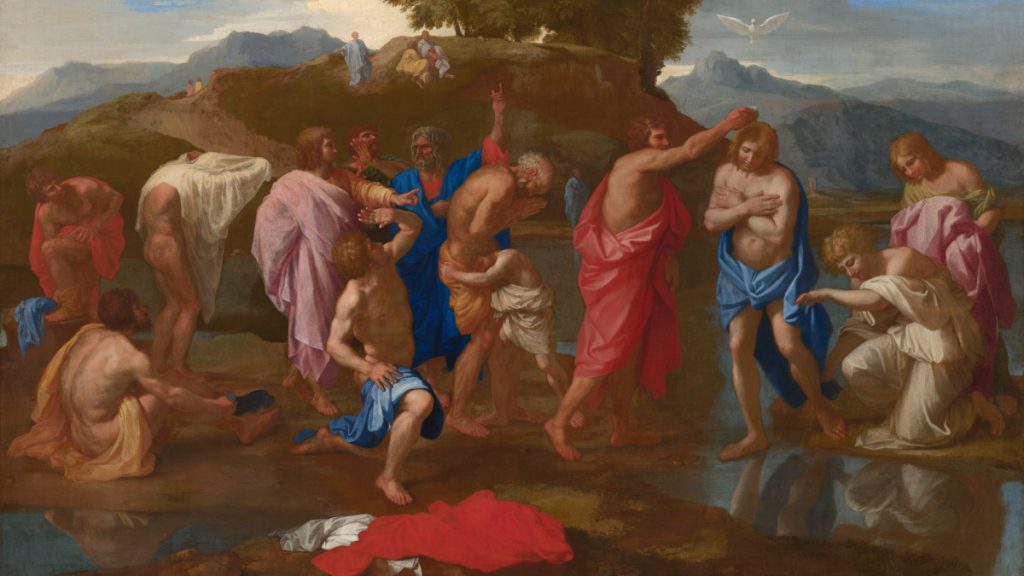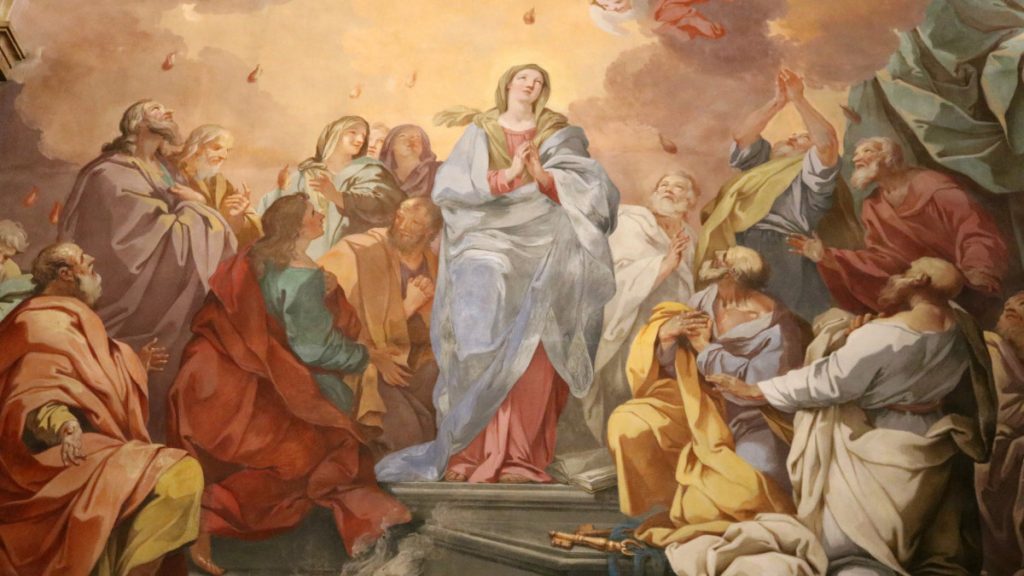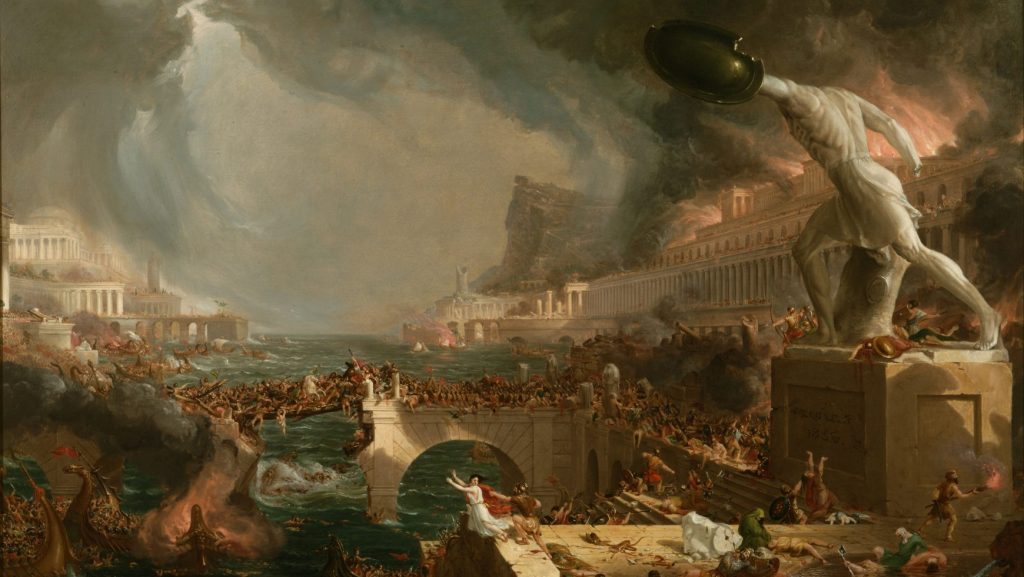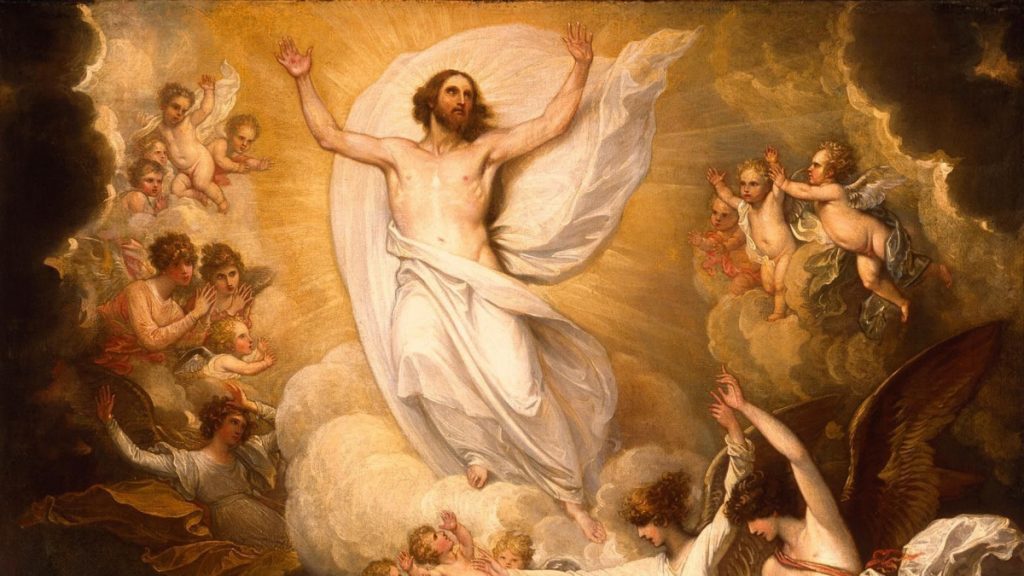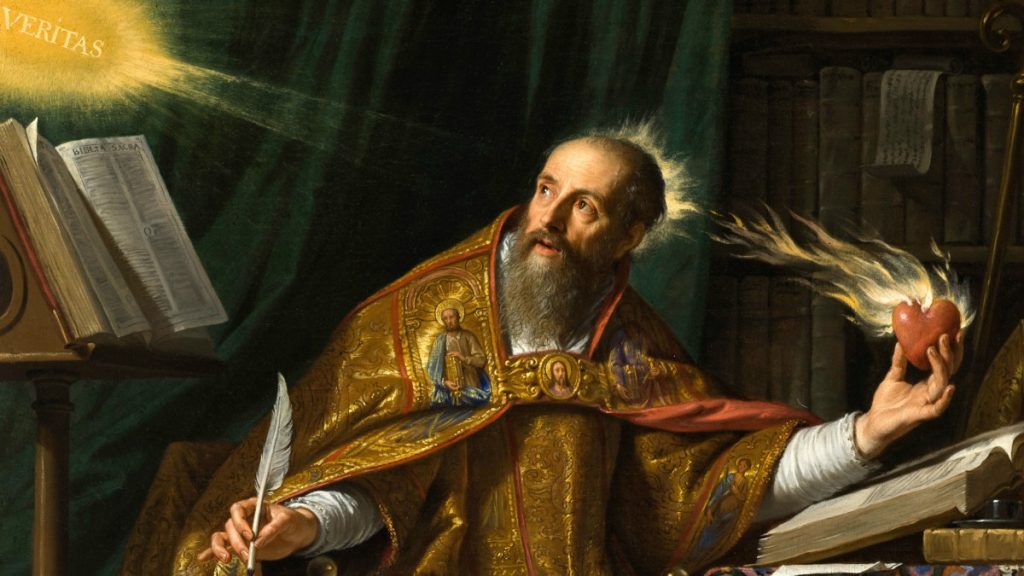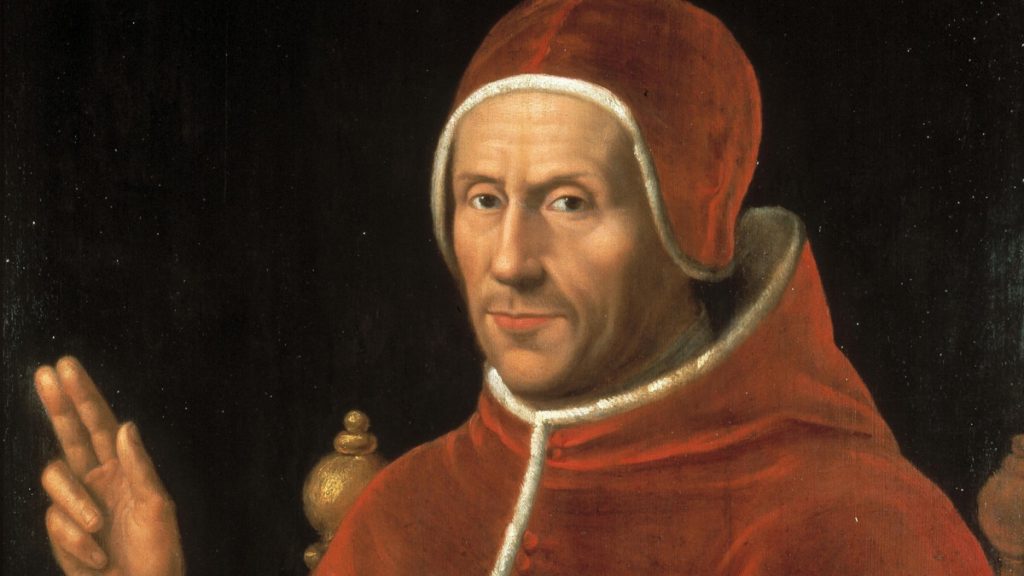(Updated July 16, 2025)
This Quote Archive is about an extraordinary and seemingly miraculous event that took place sometime around 362 or 363, when Emperor Julian the Apostate offered to help the Jews rebuild the Temple in Jerusalem. According to the various accounts, they were prevented from doing so by fire from the ground, fire from the sky, and earthquakes. Some accounts even report that the sign of the cross appeared in the sky, and/or on the clothes of the workmen.
We’ve compiled all the historical sources we’ve found for this event below. The first section includes the pagan accounts, and the second section the Christian accounts. If additional sources are found, this Study Bank will be updated accordingly.
The Christian accounts portray Julian’s attempt to rebuild the Temple as motivated by a desire to disprove the words of Christ, and with it Christianity itself. In this sense, he was a type of Antichrist.
Pagan: Emperor Julian “the Apostate” (331-363)
Emperor Julian “the Apostate,” To the Community of the Jews (c. 362-63)1
In times past, by far the most burdensome thing in the yoke of your slavery has been the fact that you were subjected to unauthorized ordinances and had to contribute an untold amount of money to the accounts of the treasury [ever since Vespasian, about AD 72, the Jews had been paying the Romans special Jewish taxes, like the Fiscus Judaicus]. Of this I used to 177 | 179 see many instances with my own eyes, and I have learned of more, by finding the records which are preserved against you. Moreover, when a tax was about to be levied on you again I prevented it, and compelled the impiety of such obloquy to cease here, and I threw into the fire the records against you that were stored in my desks, so that it is no longer possible for anyone to aim at you such a reproach of impiety.
My brother [cousin] Constantius of honored memory [in whose reign, 337-61, severe laws were enacted against the Jews] was not so much responsible for these wrongs of yours as were the men who used to frequent his table, barbarians in mind, godless in soul. These I seized with my own hands and put them to death by thrusting them into the pit, that not even any memory of their destruction might still linger amongst us.
And since I wish that you should prosper yet more, I have admonished my brother Iulus [Hillel II, the Jewish patriarch of the Sanhedrin, who died in 365], your most venerable patriarch, that the levy which is said to exist among you [the taxes paid by world Jewry for support of the Palestinian patriarchate] should be prohibited, and that no one is any longer to have the power to oppress the masses of your people by such exactions, so that everywhere, during my reign, you may have security of mind, and in the enjoyment of peace may offer more fervid prayers for my reign to the Most High God, the Creator, who has deigned to crown me with his own immaculate right hand. For it is natural that men who are distracted by any anxiety should be hampered 179 | 181 in spirit, and should not have so much confidence in raising their hands to pray, but that those who are in all respects free from care should rejoice with their whole hearts and offer their suppliant prayers on behalf of my imperial office to Mighty God, even to Him who is able to direct my reign to the noblest ends, according to my purpose.
This you ought to do, in order that, when I have successfully concluded the war with Persia, I may rebuild by my own efforts the sacred city of Jerusalem [closed to the Jews since the time of Emperor Hadrian in 135], which for so many years you have longed to see inhabited, and may bring settlers there, and, together with you, may glorify the Most High God therein.
Emperor Julian, “the Apostate,” Fragment 112
For I am rebuilding with all zeal the temple of the Most High God.
Pagan: Ammianus Marcellinus (c. 330-c. 391-400)
Ammianus Marcellinus, Res Gestae (“Things Done”)
(Book 23)3
His [Julian the Apostate’s] desire to leave a monument to perpetuate the memory of his reign led him to think in particular of restoring at enormous expense the once magnificent temple at Jerusalem, which, after much bitter fighting during its siege first by Vespasian and then by Titus, had finally been stormed with great difficulty. Alypius of Antioch, who had once governed Britain as the praetorian prefects’ deputy, was placed in charge of this project. He set to work boldly, assisted by the governor of the province, but repeated and alarming outbursts of fire-balls near the foundations made it impossible to approach the spot. Some of the workmen were burnt to death, and the obstinate resistance of the fiery element caused the design to be abandoned.
Christian: St. Ephrem the Syrian (c. 306-373) | EAST
St. Ephrem the Syrian, Hymn 4 Against Julian
(§§18-24)4
(§18) At that time terrible events were stirred up to reprove (men); (God) proclaimed the truth to souls in the world, in that cities were overthrown, to the reproach of paganism. Jerusalem condemned particularly the accursed and the crucifiers who presumptuously threatened and even entered in order to rebuild the desolation which they had caused by their sins.
(§19) Fools and senseless, they made it desolate while it was built and now that it is desolate they threaten to rebuild it. When it was established, they pulled it down, and when it was desolate they loved it. Jerusalem trembled when she saw that her destroyers again entered her and disturbed her tranquility. She complained of them to the Most High and she was heard. 125 | 126
(§20) He ordered the winds and they blew, he beckoned earthquakes and they came, lightning and it caused turmoil, the air and it became dark, walls and they were overthrown, gates and they opened themselves; fire came forth and consumed the scribes who had read in Daniel that it would be desolate forever [Dan. 9:27]; and because they had read but did not learn, they were violently smitten and then they learned!
(§21) They scattered her through the Humble One [Jesus], who had gathered together her chicks, and they hoped that the folly of the soothsayers would gather her. They overthrew her through the True One and supported her through the waverers, and they wanted to rebuild her again. They overthrew his great altar at the killing of the Holy One and thought that the builder of (pagan) altars would re-establish it.
(§22) They broke her (i.e. Jerusalem) through the wood of the Living Architect [the cross] and they supported her through the broken reed of paganism; they made her sad through Zachariah who has rejoiced her (by) “Behold your King” they (tried to) make her happy through the divination of the mad man; they proclaimed to her: “Behold, there comes one possessed who will rebuild you, he will enter and make sacrifices in you, he will pour libations in you to his demons.”
(§23) Daniel decreed about Jerusalem and determined, “She will not again be rebuilt” and Zion believed it. They bewailed themselves and wept, he had cut off and cast away their hope. Cana, through her wine, brought consolation 126 | 127 to the two mourners [Jerusalem and Zion] and gave them advice, “Do not reject the recompenses of the Good One through your mourning.”
(§24) “For now you are at rest and have peace and are delivered from the possessed and the society of demoniacs. They are in confusion and are raving and have crucified him who gives life to all, always they have torn both of you in pieces. They have killed the prophets in you, they have multiplied idols in you, through the image with four faces [a pagan idol], they have put to shame your face…
Christian: St. Gregory Nazianzus (c. 329-390) | EAST
St. Gregory Nazianzus, Oration 5: Second Invective Against Julian
(§3) He [Julian] was daily growing more infuriated against us, as though raising up waves by other waves, he that went mad first against himself, that trampled upon things holy, and that did despite unto the Spirit of Grace: is it more proper to call him Jeroboam or Ahab, those most wicked of the Israelites; or Pharaoh the Egyptian, or Nebuchadnezzar the Assyrian; or combining all together shall we name him one and the same, since he shows himself to have united in himself the vices of them all—the apostasy of Jeroboam, the bloodthirstiness of Ahab, the hardness of heart of Pharaoh, the sacrilegious acts of Nebuchadnezzar, the impiety of all put together! For when he had exhausted every other resource, and despised every other form of tyranny in our regard as trifling and unworthy of him (since there never was a character so fertile in finding out and contriving mischief), at last he stirred up against us the nation of the Jews, making his accomplice in his machinations their well-known credulity, as well as that hatred for us which has smoldered in them from the very beginning; prophesying to them out of their own books and mysteries that now was the appointed time come for them to return into their own land, and to rebuild the Temple, and restore the reign of their hereditary institutions—thus hiding his true purpose under the mark of benevolence.
(§4) And when he had formed this plan, and made them believe it (for whatever suits one’s wishes is a ready engine for deceiving people), they began to debate about rebuilding the Temple, and in large number and with great zeal set about the work. For the partisans of the other side report that not only did their women strip off all their personal ornaments and contribute it towards the work and operations, but even carried away the rubbish in the laps of their gowns, sparing neither the so precious clothes nor yet the tenderness of their own limbs, for they believed they were doing a pious action, and regarded everything of less moment than the work in hand. But they being driven against one another, as though by a furious blast of wind, and sudden heaving of the earth, some rushed to one of the neighboring sacred places to pray for mercy; others, as is wont to happen in such cases, made use of what came to hand to shelter themselves; others were carried away blindly by the panic, and struck against those who were running up to see what was the matter. There are some who say that neither did the sacred place admit them, but that when they approached the folding doors that stood wide open, on coming up to them they found them closed in their faces by an unseen and invisible power which works wonders of the sort for the confusion of the impious and the saving of the godly. But what all people nowadays report and believe is that when they were forcing their way and struggling about the entrance a flame issued forth from the sacred place and stopped them, and some it burnt up and consumed so that a fate befell them similar to the disaster of the people of Sodom, or to the miracle about Nadab and Abiud, who offered incense and perished so strangely: whilst others it maimed in the principal parts of the body, and so left them for a living monument of God’s threatening and wrath against sinners. Such then was this event; and let no one disbelieve, unless he doubts likewise the other mighty works of God! But what is yet more strange and more conspicuous, there stood in the heavens a light circumscribing a Cross, and that which before on earth was contemned by the ungodly both in figure and in name is now exhibited in heaven, and is made by God a trophy of His victory over the impious, a trophy more lofty than any other!
(§5) What will those gentlemen say of these events—they who are wise, as this world goes, and make a fine show of their own cause, smoothing down their flowing beard and trailing before our eyes that elegant philosophic mantle! Reply to me for thyself, thou writer of long discourses, that dost compose incredible stories and gapest up at the skies, telling lies about things celestial, and weaving out of the movements of the stars, people’s nativities and predictions of the future! Tell me of those stars of thine, the Ariadne’s Crown, the Berenice’s Hair, the lascivious Swan, the violent Bull! or, if thou pleasest, tell me of thine Ophiuchus, or of thy Capricorn, or of thy Lion, or all the rest that thou hast discovered for a bad end and made them into gods in constellations! Where dost thou find this cycle in thy science, where the Star that of old moved towards Bethlehem out of the East, that leader and introducer of thy own Wise Men! I, too, have something to tell from the heavens: that Star declared the presence of Christ: this Crown is that of the victory of Christ!
(§6) Thus much is taken from things celestial and sympathizing with our fortunes, in accordance with the mighty harmony and disposition of the universe. What follows let the Psalm finish for me: “Because Thou hast cast down cities,” namely, those ancient ones for the very same acts of impiety, in the middle of the very same offenses against us; some thereof overwhelmed by the floods, others swallowed up by earthquake; so that one is pretty nearly able to apply the remainder: “The memorial of them hath perished with a sound and a destruction noised abroad.” For such has been their fall, and such their ruin, also of those their neighbors who took the most delight in their impiety, so that a very long time were necessary to them for their restoration, even if anyone should have the boldness to undertake it.
(§7) Was it then only earth and heaven, and did not air likewise give a sign on that occasion, and was hallowed with the badges of the Passion? Let those who were spectators and partakers of that prodigy exhibit their garments, which to the present time are stamped with the brandmarks of the Cross! For at the very moment that anyone, either of our own brethren or of the outsiders, was telling the event or hearing it told by others, he beheld the miracle happening in his own case or to his neighbor, being all spotted with stars, or beholding the other so marked upon his clothes in a manner more variegated than could be done by any artificial work of the loom or elaborate painting. What is the result of this? Such great consternation at the spectacle that nearly all, as by one signal and with one voice, invoked the God of the Christians, and propitiated Him with many praises and supplications: whilst many, without further delay, but at the moment of the occurrence, ran up to our priests, and besought them earnestly that they might be made members of the Church, being sanctified by the holy baptism, for they had been saved by means of their fright.
Christian: St. Ambrose of Milan (c. 340-397) | WEST
St. Ambrose of Milan, Letter 2 (40): To Emperor Theodosius (December, 388)6
Have you not heard how, when Julian had ordered the Temple of Jerusalem rebuilt, those who were clearing the rubbish were burned by fire from heaven? Are you not afraid that this will also happen now? In fact, you should never have given an order such as Julian would have given.
Christian: St. Jerome (c. 342/347-420) | EAST/WEST
St. Jerome, Commentary on Daniel
(Commentary on 11:34)7
Interpreting: “When they fall, they shall receive a little help.”
Our writers, however, would have it understood that the small help shall arise under the reign of the Antichrist, for the saints shall gather together to 135 | 136 resist him, and afterwards a great number of the learned shall fall. And this shall take place in order that they may be refined as by fire in the furnace, and that they may be made white and may be chosen out, until the time before determined arrives–for the true victory shall be won at the coming of Christ.
Some of the Jews understand these things as applying to the princes Severus and Antoninus, who esteemed the Jews very highly. But others understand the Emperor Julian as the one referred to; for after they had been oppressed by Gaius Caesar and had steadfastly endured such suffering in the afflictions of their captivity, Julian rose up as one who pretended love for the Jews, promising that he would even offer sacrifice in their temple. They were to enjoy a little help from him, and a great number of the Gentiles were to join themselves to their party, although falsely and insincerely. For it would only be for the sake of their own idolatrous religion that they would pretend friendship to the Jews. And they would do this in order that those who were approved might be made manifest [1 Cor. 11:19]. For the time of their true salvation and help will be the coming of the Christ; for the Jews mistakenly imagine that he (i.e. their Messiah) is yet to come, for they are going to receive the Antichrist (when he comes).
Christian: Rufinus of Aquileia (344/45-411) | WEST
Rufinus of Aquileia, Ecclesiastical History (c. 402-403)
(Book 10, §§38-40)8
(§38) Now such were his [Julian’s] acuteness and cunning in deception 430 | 431 that he even deluded the unhappy Jews, enticing them with the sort of vain hopes that he himself entertained. The very first thing he did was to summon them to himself and ask them why they did not offer sacrifice, when their law included commandments for them about sacrifices. Thinking an opportunity had come their way, they answered, “We cannot do so except in the temple in Jerusalem. For thus the law ordains.” And having received from him permission to repair the temple, they grew so arrogant that it was as though one of the prophets had been restored to them. Jews came together from every place and province and began to make their way to the site of the temple, long since consumed by fire, a count [Alypius] having been assigned by the emperor to push forward the work, which was pursued with all earnestness and financed with both public and private funds.
Meanwhile they insulted our people and, as though the time of the kingdom had returned, threatened them harshly and treated them cruelly; in a word, they behaved with monstrous arrogance and pride. Cyril was the bishop of Jerusalem, following Maximus the confessor. The foundations, then, having been cleared, and quicklime and stone procured, nothing more was needed before new foundations could be laid the next day once the old ones had been dislodged. The bishop, however, having carefully weighed both what was contained in Daniel’s prophecy about the times [Dan. 9:27], and what the Lord had foretold in the gospels, insisted that the Jews would never be able to put a stone upon a stone there [Matt. 24:2; Mark 13:2; Luke 19:44, 21:6]. Thus the suspense grew (see St. Cyril of Jerusalem, Catechetical Lecture 15).
(§39) And behold, on the night which alone remained before the work was to begin, there was a violent earthquake, and not only were the stones for the foundations tossed far and wide, but almost all the buildings round about were leveled to the ground. The public porticoes too, in which the multitude of Jews was staying who were clearly intent on completing the project, tumbled to the ground, burying all the Jews inside. At daybreak, thinking that it had escaped the misfortune, the remaining multitude hurried together to look for those who had been buried.
(§40) Now there was a chamber sunk in the lower part of the temple which had its entrance between two porticoes that had been leveled to the ground; in it were kept some iron implements and other things necessary for the work. Out of it there suddenly burst a globe of fire which sped through the square, weaving this way and that and burning and killing the Jews who were there. This happened again and again with great frequency throughout the whole day, checking the rashness of the obstinate people with the avenging flames, while meanwhile all who were there were in such great fear and trembling that in their terror they were forced, however unwillingly, to admit that Jesus Christ is the one true God. And so that these things would not be held to have happened by chance, on the following night the sign of the cross appeared on everyone’s clothing so clearly that even those who in their unbelief wanted to wash it off could find no way to get rid of it. Thus the Jews and pagans in their fright abandoned both the site and the useless project.
Christian: St. John Chrysostom (c. 347-407) | EAST
St. John Chrysostom, Homily 4 on Matthew
For so even in our generation, in the instance of him who surpassed all in ungodliness, I mean Julian, many strange things happened. Thus when the Jews were attempting to raise up again the temple at Jerusalem, fire burst out from the foundations, and utterly hindered them all…For it is usual with God to do such things; when evils are multiplied, and He sees His own people afflicted, and their adversaries greatly intoxicated with their dominion over them, then to display His own power; which he did also in Persia with respect to the Jews.
St. John Chrysostom, Discourse 5 Against Judaizing Christians
(Ch. 10, §7; Ch. 11, §§4-10)9
CHAPTER 10
(§7) What is there for me to say to you now that has not already been said? When the prophets predicted the other captivities [of the Jews], they spoke not only of the captivity but also of the length of time it was appointed for each bondage to last; for this present captivity, however [post-Christ], they set no time but, to the contrary, said that the desolation would endure until the end [Dan. 9:27]. And to prove that what they said is true, come now and let me offer as witnesses the events themselves. 135 | 136 If the Jews had never attempted to rebuild the temple, they could say: “If we had wished to set our hands to the task and to begin to rebuild it, we could by all means have completed the task.” But now I shall show that not once, nor twice, but three times they did attempt it and three times, like wrestlers in the Olympic games, they were thrown to the ground. Therefore there can be no dispute or question but that the Church has won the victory crown.
CHAPTER 11
136 | 137 … (§4) But what I am going to tell you is clear and obvious even to the very young. For it did not happen in the time of Hadrian or Constantine [the previous two attempts to rebuild the Temple], but during our own lifetime, in the reign of the Emperor of twenty years ago [Julian the Apostate]. Julian, who surpassed all the emperors in irreligion, invited the Jews to sacrifice to idols in an attempt to drag them to his own level of ungodliness. He used their old way of sacrifice as an excuse and said: “In the days of your ancestors, God 137 | 138 was worshiped in this way.”
(§5) They refused his invitation, but, at that time, they did admit to the very things I just lately proved to you, namely, that they were not allowed to offer their sacrifices outside Jerusalem. Their answer was that those who offered any sacrifice whatsoever in a foreign land were violating the Law. So they said to the Emperor: “If you wish to see us offer sacrifices, give us back Jerusalem, rebuild the temple, show us the holy of holies, restore the altar, and we will offer sacrifices again just as we did before.”
(§6) These abominable and shameless men [the Jewish leaders] had the impudence to ask these things from an impious pagan [Julian] and to invite him to rebuild their sanctuary with his polluted hands. They failed to see that they were attempting the impossible. They did not realize that if human hands had put an end to those things, then human hands could get them back for them. But it was God who destroyed their city, and no human power could ever change what God had decreed. “For what God, the Holy One, has planned who shall dissipate? His hand is stretched out; who will turn it back?” (Isa. 14:27). What God has reared up and wishes to remain, no man can tear down. In the same way, what he has destroyed and wishes to stay destroyed, no man can rebuild.
(§7) I grant you that the Emperor did give you Jews back your temple and did build you an altar, just as you foolishly suspected he would. But he could not send down to you the heavenly fire from on high, could he [referring to Solomon’s dedication of the Temple, recounted in 2 Chron. 7]? Yet if you could not have this fire, your sacrifice had to be an abomination and unclean [Lev. 9:23-24]. This is why the sons of 138 | 139 Aaron perished; they brought in a foreign fire [Lev. 10:1-2; Num. 3:4].
(§8) Nonetheless, these Jews, who were blind to all things, called on the Emperor for help and begged him to aid them in undertaking to rebuild the temple. The Emperor, for his part, spared no expense, sent engineers from all over the empire to oversee the work, summoned craftsmen from every land; he left nothing undone, nothing untried. He overlooked nothing but worked quietly and a little at a time to bring the Jews to offer sacrifice; in this way he expected that it would be easy for them to go from sacrifice to the worship of idols. At the same time, in his mad folly, he was hoping to cancel out the sentence passed by Christ which forbade the rebuilding of the temple. But He who catches the wise in their craftiness [1 Cor. 3:19; Job 5:13] straightaway made clear to him by His action that the decrees of God are mightier than any man’s and that works get their strength from the word of God.
(§9) They started to work in earnest on that forbidden task, they removed a great mound of earth and began to lay bare the foundations. They were just about to start building when suddenly fire leaped forth from the foundations and completely consumed not only a great number of the workmen but even the stones piled up there to support the structure. This put a stop to the untimely obstinacy of those who had undertaken the project. Many of the Jews, too, who had seen what had happened, were astonished and struck with shame. The Emperor Julian had been madly eager to finish the work. But when he heard what had happened, he was afraid that, if he went on with it, he might call down the fire on his 139 | 140 own head. So he and the whole Jewish people withdrew in defeat.
(§10) Even today, if you go into Jerusalem, you will see the bare foundation; if you ask why this is so, you will hear no explanation other than the one I gave. We are all witnesses to this, for it happened not long ago but in our own time. Consider how conspicuous our victory is. This did not happen in the times of the good emperors; no one can say that the Christians came and prevented the work from being finished. It happened at a time when our religion was subject to persecution, when all our lives were in danger, when every man was afraid to speak, when paganism flourished. Some of the faithful hid in their homes, others fled the marketplaces and moved to the deserts. That is when these events occurred. So the Jews have no excuse left to them for their impudence.
St. John Chrysostom, Discourse 6 Against Judaizing Christians
(Ch. 2, §2)10
But Daniel did not reveal that it [Jewish bondage] would come to an end [after Christ] nor that these troubles would ever stop. Nor did any other prophet. Daniel did, however, predict the opposite, namely, that this bondage would hold them in slavery until the end of time. The great number of years which have come and gone since that day are witnesses to the truth of what he said. And the years have shown neither trace nor beginning of a change for the better, even though the Jews tried many times to rebuild their temple. Not once, not twice, but three times they tried. They tried in the time of Hadrian, in the time of Constantine, and in the time of Julian. But each time they tried they were stopped. The first two times they were stopped by military force; later it was by the fire which leaped forth from the foundations and restrained them from their untimely obstinacy.
Christian: Philostorgius (368-c. 439) | EAST
Philostorgius, Church History (c. 425-433)
The Apostate [referring to Julian] thought that he would prove false our Savior’s prophecies that Jerusalem would be so completely overthrown that not even a stone would be left upon a stone (Matt. 24:2; Mark 13:2; Luke 19:44, 21:6); not only, however, did he not succeed in his attempt, but he even provided unshakeable, if involuntary, confirmation of what the prophecies contained.
What he did was to gather the Jews from wherever they were, provide them with funds and other assistance from his own resources, and bid them restore the temple. But the terrors sent by God, which defy all description, not only snuffed their enthusiasm but reduced the Jews and him to utter helplessness and shame. What happened is that fire devoured those who were daring to set to work, an earthquake buried the site, and still other folk were cut to pieces in other accidents, so that the arrogance that had thought to bring shame upon the words of the Lord ended up by proclaiming, despite itself, how impossible it was to taint such venerable prophecies with any hint of shame. 104 | 105
[AP §58] Julian himself…gave orders for the restoration of the temple of the Jews in Jerusalem as well. He put the Christians out of the city and allowed the Jews to settle there, sending one Alypius to carry out zealously the work of rebuilding the temple.
[AP §68] As we said earlier, Julian the Apostate sent orders to Jerusalem to rebuild the temple of the Jews that Vespasian and his son Titus had destroyed and burned together with the city, just as Christ the Lord had foretold concerning it to his disciples, bearers of God’s word: “Not a stone will remain upon a stone that will not be thrown down” (Matt. 24:2). The wicked man, then, in his desire to show that Christ’s words were false, was above all anxious to rebuild the temple, and he ordered that the total cost of construction be paid from public funds. The God-killing Jews flocked together therefore and set to work with great joy and were excavating the foundation trench with silver mattocks and shovels and making ready to lay the foundation, when a terrific storm arose that buried the excavation site. All during that night it lightened and thundered ceaselessly, until finally as day was approaching there was an earthquake in which many perished even of those who had stayed out of doors. And a fire that came out of the excavated foundations incinerated everyone who was there. There were also cities that collapsed, Nicopolis, Neapolis, Eleutheropolis, Gaza, and many others. Not only that, but the colonnade by the Jewish synagogue in Aelia, that is to say, Jerusalem, fell down, killing many of those mentioned earlier, and fire burst forth mysteriously and incinerated a great many Jews. Darkness also fell upon these places, while continuous earthquakes caused great damage to many cities.
Christian: Socrates of Constantinople (c. 380-after 439) | EAST
Socrates of Constantinople, Ecclesiastical History (c. 439)
The emperor [Julian the Apostate] in another attempt to molest the Christians exposed his superstition. Being fond of sacrificing, he not only himself delighted in the blood of victims, but considered it an indignity offered to him, if others did not do likewise. And as he found but few persons of this stamp, he sent for the Jews and inquired of them why they abstained from sacrificing, since the law of Moses enjoined it? On their replying that it was not permitted them to do this in any other place than Jerusalem, he immediately ordered them to rebuild Solomon’s temple.
Meanwhile he himself proceeded on his expedition against the Persians. The Jews who had been long desirous of obtaining a favorable opportunity for rearing their temple afresh in order that they might therein offer sacrifice, applied themselves very vigorously to the work. Moreover, they conducted themselves with great insolence toward the Christians, and threatened to do them as much mischief, as they had themselves suffered from the Romans.
The emperor having ordered that the expenses of this structure should be defrayed out of the public treasury, all things were soon provided, such as timber and stone, burnt brick, clay, lime, and all other materials necessary for building. On this occasion Cyril bishop of Jerusalem called to mind the prophecy of Daniel [Dan. 9:27], which Christ also in the holy gospels has confirmed, and predicted in the presence of many persons, that the time had indeed come “in which one stone should not be left upon another in that temple” (Matt. 24:2), but that the Savior’s prophetic declaration should have its full accomplishment.
Such were the bishop’s words: and on the night following, a mighty earthquake tore up the stones of the old foundations of the temple and dispersed them all together with the adjacent edifices. Terror consequently possessed the Jews on account of the event; and the report of it brought many to the spot who resided at a great distance. When therefore a vast multitude was assembled, another prodigy took place. Fire came down from heaven and consumed all the builders’ tools, so that the flames were seen preying upon mallets, irons to smooth and polish stones, saws, hatchets, adzes [pronounced “ads”], in short all the various implements which the workmen had procured as necessary for the undertaking; and the fire continued burning among these for a whole day.
The Jews indeed were in the greatest possible alarm, and unwillingly confessed Christ, calling him God: yet they did not do his will; but influenced by inveterate prepossessions they still clung to Judaism. Even a third miracle which afterwards happened failed to lead them to a belief of the truth. For the next night luminous impressions of a cross appeared imprinted on their garments, which at daybreak they in vain attempted to rub or wash out. They were therefore “blinded” as the apostle says [Rom. 11:25; 2 Cor. 3:14], and cast away the good which they had in their hands: and thus was the temple, instead of being rebuilt, at that time wholly overthrown.
Christian: Theodoret of Cyrus (c. 393-c. 458/466) | EAST
Theodoret of Cyrus, Ecclesiastical History (c. 449-459)
Julian [the Apostate], who had made his soul a home of destroying demons, went his corybantic [wild, frenzied] way, ever raging against true religion. He accordingly now armed the Jews too against the believers in Christ. He began by inquiring of some whom he got together why, though their law imposed on them the duty of sacrifices, they offered none.
On their reply that their worship was limited to one particular spot, this enemy of God immediately gave directions for the re-erection of the destroyed temple, supposing in his vanity that he could falsify the prediction of the Lord, of which, in reality, he exhibited the truth [Matt. 24:2]. The Jews heard his words with delight and made known his orders to their countrymen throughout the world. They came with haste from all directions, contributing alike money and enthusiasm for the work; and the emperor made all the provisions he could, less from the pride of munificence [generosity] than from hostility to the truth. He dispatched also as governor a fit man to carry out his impious orders [Alypius of Antioch]. It is said that they made mattocks, shovels, and baskets of silver.
When they had begun to dig and to carry out the earth a vast multitude of them went on with the work all day, but by night the earth which had been carried away shifted back from the ravine of its own accord. They destroyed moreover the remains of the former construction, with the intention of building everything up afresh; but when they had got together thousands of bushels of chalk and lime, of a sudden a violent gale blew, and storms, tempests and whirlwinds scattered everything far and wide.
They still went on in their madness, nor were they brought to their senses by the divine long suffering. Then first came a great earthquake, fit to strike terror into the hearts of men quite ignorant of God’s dealings; and, when still they were not awed, fire running from the excavated foundations burnt up most of the diggers, and put the rest to flight.
Moreover when a large number of men were sleeping at night in an adjacent building it suddenly fell down, roof and all, and crushed the whole of them. On that night and also on the following night the sign of the cross of salvation was seen brightly shining in the sky, and the very garments of the Jews were filled with crosses, not bright but black. When God’s enemies saw these things, in terror at the heaven-sent plagues they fled, and made their way home, confessing the Godhead of Him who had been crucified by their fathers. Julian heard of these events, for they were repeated by everyone. But like Pharaoh he hardened his heart.
Christian: Sozomen (c. 400-c. 450) | EAST
Sozomen, Ecclesiastical History (c. 440-43)
Though the emperor [Julian the Apostate] hated and oppressed the Christians, he manifested benevolence and humanity towards the Jews. He wrote to the Jewish patriarchs and leaders, as well as to the people, requesting them to pray for him, and for the prosperity of the empire. In taking this step he was not actuated, I am convinced, by any respect for their religion; for he was aware that it is, so to speak, the mother of the Christian religion, and he knew that both religions rest upon the authority of the patriarchs and the prophets; but he thought to grieve the Christians by favoring the Jews, who are their most inveterate enemies. But perhaps he also calculated upon persuading the Jews to embrace paganism and sacrifices; for they were only acquainted with the mere letter of Scripture, and could not, like the Christians and a few of the wisest among the Hebrews, discern the hidden meaning.
Events proved that this was his real motive; for he sent for some of the chiefs of the race and exhorted them to return to the observance of the laws of Moses and the customs of their fathers. On their replying that because the temple in Jerusalem was overturned, it was neither lawful nor ancestral to do this in another place than the metropolis out of which they had been cast, he gave them public money, commanded them to rebuild the temple, and to practice the cult similar to that of their ancestors, by sacrificing after the ancient way.
The Jews entered upon the undertaking, without reflecting that, according to the prediction of the holy prophets, it could not be accomplished [Dan. 9:27]. They sought for the most skillful artisans, collected materials, cleared the ground, and entered so earnestly upon the task, that even the women carried heaps of earth, and brought their necklaces and other female ornaments towards defraying the expense. The emperor, the other pagans, and all the Jews, regarded every other undertaking as secondary in importance to this.
Although the pagans were not well-disposed towards the Jews, yet they assisted them in this enterprise, because they reckoned upon its ultimate success, and hoped by this means to falsify the prophecies of Christ [Matt. 24:2]. Besides this motive, the Jews themselves were impelled by the consideration that the time had arrived for rebuilding their temple.
When they had removed the ruins of the former building, they dug up the ground and cleared away its foundation. It is said that on the following day when they were about to lay the first foundation, a great earthquake occurred, and by the violent agitation of the earth, stones were thrown up from the depths, by which those of the Jews who were engaged in the work were wounded, as likewise those who were merely looking on. The houses and public porticos, near the site of the temple, in which they had diverted themselves, were suddenly thrown down; many were caught thereby, some perished immediately, others were found half dead and mutilated of hands or legs, others were injured in other parts of the body.
When God caused the earthquake to cease, the workmen who survived again returned to their task, partly because such was the edict of the emperor, and partly because they were themselves interested in the undertaking. Men often, in endeavoring to gratify their own passions, seek what is injurious to them, reject what would be truly advantageous, and are deluded by the idea that nothing is really useful except what is agreeable to them. When once led astray by this error, they are no longer able to act in a manner conducive to their own interests, or to take warning by the calamities which are visited upon them.
The Jews, I believe, were just in this state; for, instead of regarding this unexpected earthquake as a manifest indication that God was opposed to the re-erection of their temple, they proceeded to recommence the work. But all parties relate, that they had scarcely returned to the undertaking, when fire burst suddenly from the foundations of the temple, and consumed several of the workmen.
This fact is fearlessly stated, and believed by all; the only discrepancy in the narrative is that some maintain that flame burst from the interior of the temple, as the workmen were striving to force an entrance, while others say that the fire proceeded directly from the earth. In whichever way the phenomenon might have occurred, it is equally wonderful [meaning, full of awe].
A more tangible and still more extraordinary prodigy ensued; suddenly the sign of the cross appeared spontaneously on the garments of the persons engaged in the undertaking. These crosses were disposed like stars, and appeared the work of art. Many were hence led to confess that Christ is God, and that the rebuilding of the temple was not pleasing to Him; others presented themselves in the church, were initiated, and besought Christ, with hymns and supplications, to pardon their transgression.
If anyone does not feel disposed to believe my narrative, let him go and be convinced by those who heard the facts I have related from the eyewitnesses of them, for they are still alive. Let him inquire, also, of the Jews and pagans who left the work in an incomplete state, or who, to speak more accurately, were able to commence it.
Christian: St. Isidore of Seville (c. 560-636) | WEST
St. Isidore of Seville, Chronicon (c. 615-630s)
(Sixth Age of the World, §101)
Julian [the Apostate] ruled for two years. He went from being a cleric to being an emperor and a pagan. He was converted to the cult of the idols and instituted martyrdom for the Christians. He forbade Christians to teach or learn the liberal arts.
At that time he also, out of his hatred for Christ, permitted the Jews to repair the Temple of Jerusalem. Jews gathered from all the provinces and laid new foundations for the Temple. Suddenly at night an earthquake struck and the stones from the deepest parts of the foundation were shaken and scattered far and wide. In addition a fiery ball came out from the interior of the building of the Temple and prostrated many with its fire. Those remaining were frightened by this terror and involuntarily confessed Christ. And lest they thought it was over with this destruction, the sign of the cross appeared the following night on everyone’s clothing. Julian, proceeding against the Persians, died, having been hit with a javelin as the attack was being launched.
Footnotes
- Emperor Julian, W.C. Wright, trans., The Works of the Emperor Julian, Vol. 3 (New York: G.P. Putnam’s Sons, 1923), 177-81. Another source: Fordham University, Internet Jewish History Sourcebook: The Emperor Julian and the Jews 361-363 CE. ↩︎
- Emperor Julian, W.C. Wright, trans., The Works of the Emperor Julian, Vol. 3 (New York: G.P. Putnam’s Sons, 1923), 301. ↩︎
- Ammianus Marcellinus, Walter Hamilton, trans., The Later Roman Empire (New York: Penguin Books, 1986), 255. ↩︎
- Samuel N.C. Lieu, ed., Translated Texts for Historians, Vol. 2, 2nd ed.: The Emperor Julian–Panegyric and Polemic (Liverpool: Liverpool University Press, 1986), 125-27. ↩︎
- C.W. King, trans., Julian the Emperor (London: George Bell and Sons, 1888), 87-91. ↩︎
- St. Ambrose of Milan, Sister Mary Melchior Beyenka, OP, trans., The Fathers of the Church, Vol. 26: Saint Ambrose, Letters (Washington, DC: The Catholic University Press of America, 1954), 11. ↩︎
- St. Jerome, Gleason L. Archer, trans., Jerome’s Commentary on Daniel (Eugene, OR: Wipf & Stock, 2009), 135-36. ↩︎
- Rufinus of Aquileia, Philip R. Amidon, SJ, trans., The Fathers of the Church, Vol. 133: Rufinus of Aquileia, History of the Church (Washington, DC: The Catholic University of America Press, 2016), 429-31. ↩︎
- St. John Chrysostom, Paul W. Harkins, trans., The Fathers of the Church, Vol. 68: Discourses Against Judaizing Christians (Washington, DC: The Catholic University of America Press, 1979), 135-36, 137-40. ↩︎
- St. John Chrysostom, Paul W. Harkins, trans., The Fathers of the Church, Vol. 68: Discourses Against Judaizing Christians (Washington, DC: The Catholic University of America Press, 1979), 150. ↩︎
- Philostorgius, Philip R. Amidon, SJ, trans., Philostorgius: Church History (Atlanta: Society of Biblical Literature, 2007), 104-105. In the account quoted, the sections marked “AP” are from a later 8th century work memorializing the life of St. Artemius (who was martyred by Julian the Apostate) called the Artemii Passio, but which are believed to have been derived from Philostorgius’s original account. ↩︎
